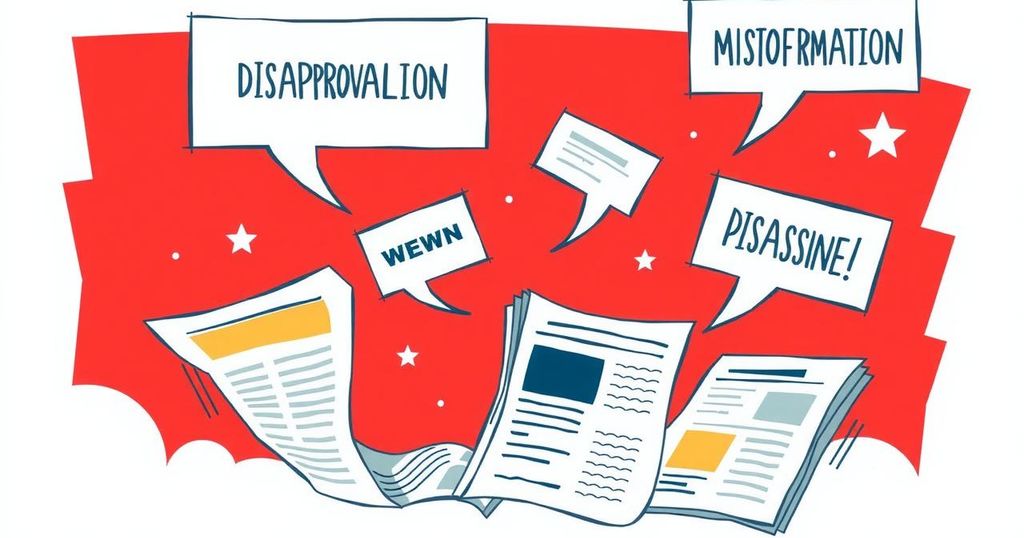Allan Ngumuya, former MP, denies any ties between UTM and Kenneth Bwanali amid the Age Limit Bill controversy. He condemns misinformation surrounding political motivations behind the bill, which critics allege seeks to block former President Mutharika from running in 2025. Ngumuya’s statements reaffirm UTM’s disassociation from Bwanali and emphasize the necessity of clarity in political discourse.
Allan Ngumuya, a former Member of Parliament, has publicly disavowed any connections between himself, the United Transformation Movement (UTM), and the controversial Age Limit Bill currently debated in Malawi. His statements were prompted by social media claims, particularly from Bakili Muluzi TV, alleging that individuals affiliated with various political groups, including the ruling Malawi Congress Party (MCP), were advancing the bill.
Ngumuya categorically denied the involvement of Kenneth Bwanali in UTM or its operations. “Kenneth Bwanali is not a senior member, and he is not UTM,” he stressed, rejecting any assumptions related to Bwanali’s participation in the party. Furthermore, Ngumuya labeled Bwanali as an imposter, asserting, “He is a fake, he is not real, and he is not part of UTM. All that he writes and circulates on social media is fake news from other forums. He is disowned by both me and the party.”
The Age Limit Bill has provoked intense political debate, with many critics alleging it aims to prevent former President Peter Mutharika from running in the upcoming 2025 elections. Mutharika, who served as president from 2014 to 2020, has indicated interest in a political comeback, which appears to threaten certain factions within the MCP. Many observers believe the bill is a strategic attempt to eliminate his candidacy, thus altering the electoral landscape.
The controversy escalated when Bakili Muluzi TV published a roster of individuals purportedly enlisted by MCP to advocate for the bill. Among those named were various notable figures, sparking further debate about the bill’s origin and motives. The post also unveiled personal contact information for some of the individuals named, raising significant privacy issues.
Allegedly, sponsors of Dr. Dalitso Kabambe, a potential presidential candidate, are anxious about Mutharika’s political leverage and are purportedly collaborating to ensure his disqualification through the Age Limit Bill. However, no official statements have been released by either MCP or the individuals mentioned, which has perpetuated speculation within the political climate.
Ngumuya has reinforced UTM’s stance against these allegations, stating emphatically, “He [Bwanali] must not confuse people. The entire UTM is distancing itself from this fake news. I have to say it on behalf of DK (Dr. Dalitso Kabambe) and the party too.” This reiteration highlights the persistent issue of misinformation affecting Malawi’s political discourse.
As the 2025 elections approach, the spread of political propaganda, false narratives, and unverified claims on social media presents a considerable challenge for political entities and the electorate striving to discern truths from falsehoods. The Age Limit Bill remains a contentious subject, embraced by some as necessary reform for generational political transition, while others view it as a tactic to suppress political rivalry.
The lack of definitive communication from the government has only served to heighten uncertainty regarding Malawian politics, complicating the upcoming electoral period. Regardless of the outcome, Ngumuya and UTM have firmly distanced themselves from any associations with Bwanali and the Age Limit Bill debate.
In summary, Allan Ngumuya’s disavowal of Kenneth Bwanali and UTM’s connection to the Age Limit Bill highlights the complexities of Malawi’s political environment. The ongoing controversy reflects broader issues of misinformation and political maneuvering as the 2025 elections approach. Despite claims made in social media, Ngumuya has clarified UTM’s non-involvement, while the Age Limit Bill continues to be a divisive topic among Malawian citizens as trust in government communications wanes.
Original Source: malawi24.com






